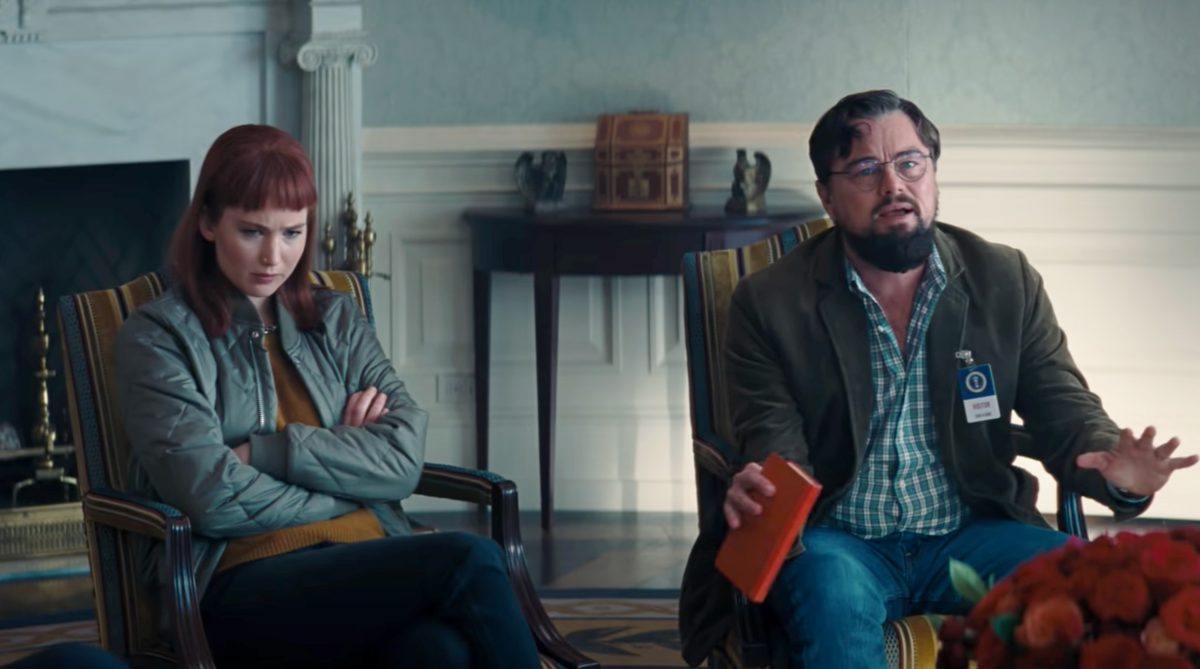This review contains spoilers for Don’t Look Up.
I was lucky to attend a showing of Don’t Look Up, the latest cultural satire from director Adam McKay, with my good friend and former Grist colleague Amelia Urry. Amelia is studying for her doctorate in the history of science at Cambridge, and during the car ride home, she described to me a famous historical misadventure in the realm of science communication. In the 1700s, French astronomer Jérôme Lalande compiled a catalog of comets that had some probability of hitting Earth. But the odds of any impact, he noted at some point in the latter part of the catalog, were really quite low. However, through some mishap, only the first segment of the catalog made it to the French press, who eagerly distributed the news that the Earth would be hit by a meteor. Mass panic ensued.
This story has been told and retold over the centuries, including in a novel by a 19th century astronomer titled La Fin du Monde (“the end of the world”). The Lalande saga has become a sort of foundational cautionary tale of what can go wrong when informing the world of impending doom.
Don’t Look Up, Amelia noted, is a contemporary retelling of this text in reverse: the probability of widespread destruction is extremely high, and the public’s level of alarm disproportionately low. McKay, who co-wrote the film with screenwriter David Sirota, has been open about the fact that the film is a two-and-a-half-hour allegory for our climate crisis. But the impending existential threat comes not in the form of higher carbon emissions — famously difficult to portray as threatening — but in a 9-kilometer-wide comet heading straight for the Chilean coast. The impact of such a cosmic body would, according to scientific consensus, result in mass extinction of life on Earth.
It falls to undistinguished astronomy professor Randall Mindy (Leonardo DiCaprio) and his doctoral student Kate Dibiasky (Jennifer Lawrence) to share their terrifying findings with the world, and they run into all sorts of obstacles. A litany of journalists and government officials tell the two schlubby and earnest protagonists that they need “media training,” morning show hosts want the news to be presented “nice and light,” the news of a pop star’s breakup and subsequent engagement far outshines that of the comet, and Kate’s onscreen meltdown becomes a popular meme.
This is the first hour or so of the movie, and it all feels like a rather cruel public trial of the shallowness of Western culture here in the 2020s. There is one directorial choice that actually works rather well: little segments throughout the film of footage of nature, rapidly spliced with crowds of people all over the world with faces turned toward phones or televisions. It effectively conveys the experience of living today and watching so much unspeakable disaster unfold on a screen that fits in your hand or hangs over a bar. (It called to mind a similar motif employed in Oliver Stone’s 1994 Natural Born Killers, a satire of how the media romanticizes serial killers.)
But as a climate journalist, the villainization of “the media” writ large for failing to avert the end of the world seems to target the wrong culprit. At least, it seems incomplete not to acknowledge or even gesture at the prodigious efforts by oil companies to downplay the severity of the risk of climate change, often using the media as a tool. Exxon, for example, invested heavily in obscuring its findings that fossil fuel extraction would cause planet-endangering degrees of warming; many other oil and gas companies and their lobbying firms went on to engineer science-discrediting media coverage of climate change. To this day, you will find any number of ads that either tout fossil fuel producers’ so-called green bonafides or gently suggest that you, dear viewer, really ought to recycle more.
McKay’s choice of metaphor makes it basically impossible to explore this history. But in the second half of the film, another villain shows up on the scene: a creepy tech billionaire played by Mark Rylance, who teams up with the blustering, Trump-esque president (Meryl Streep) to come up with a long-shot, untested scheme to harvest valuable minerals from the comet. This is where things become a little more uncomfortably familiar. The billionaire — reminiscent of a certain electric car, space, and tunnel entrepreneur — takes it upon himself to save the world; the president holds rallies denying the comet’s danger. Randall, Kate, and NASA scientist Teddy Oglethorpe (Rob Morgan) organize protests begging Americans to “just look up,” including a highly produced blowout concert featuring a fatalistic hit single performed by pop star Riley Bina (Ariana Grande).
But what do you do when you do “look up” to find a comet that threatens all of life on Earth fast approaching? There is some rushed, muttered beseeching to call on the president to change her course of action days before the comet is scheduled to hit Earth, which is so obviously futile in the particular universe of this film that you wonder why you’d insist people look up at all.
And this is where the metaphor of comet really starts to fall apart. Much hand-wringing has been done over the fact that the threat of ecological collapse even one or two generations down the line will not elicit nearly the same psychological threat response of, say, a comet visibly hurtling to Earth. Humans are woefully, self-sabotagingly bad at accounting for future threats to our wellbeing that we can’t immediately perceive with our own senses. What’s more, the fate of our climate is not yet sealed, and there are significantly more opportunities for its mitigation than the film’s single space mission. If McKay is hoping to activate his audience to do more on climate change, it’s a very confusing tactic.
Despite the muddled symbolism, I actually find the lack of optimism in Don’t Look Up to be kind of refreshing because there’s not a whole lot that’s uplifting in the realm of climate change, and I’m not particularly fond of the movie-as-public-service-announcement genre. The film’s best moments are not its many heavyhanded potshots at a smartphone-obsessed public, facile news industry, and criminally incompetent government. (We get it; we know.) They are depictions of people reckoning with what is to come.
Perhaps the most relatable moment in the whole film is when Kate has another public meltdown at Bojo Mambo’s, a middlebrow restaurant best described as a Buffalo Wild Wings for shrimp. She announces to the gathered patrons that the president has decided not to pursue a mission that would break up the comet, but rather to attempt to harvest the minerals from it to further enrich some more billionaires. The patrons then destroy Bojo Mambo’s in a riot. This speaks to me, because I am frequently suppressing fits of rage at the systemic lack of animus on climate change.
At the opposite end of the emotional spectrum, I also enjoyed the surprisingly tender performance of Timothée Chalamet as a crypto-religious dreadlocked drifter type who is completely disillusioned by the government. He appears as a sort of spiritual salvation for Kate, his sedate Christian optimism seeming to lift her out of complete despair.
I don’t think it’s much of a spoiler to tell you that the world explodes at the end. From the very beginning, you can’t see it working out any other way. But if, when the credits roll, you are left thinking: If only the end of the world had been communicated better, everything would have been OK — well, I cannot help you. In the 21st century, the media is up against a whole lot more than some misplaced pages.




